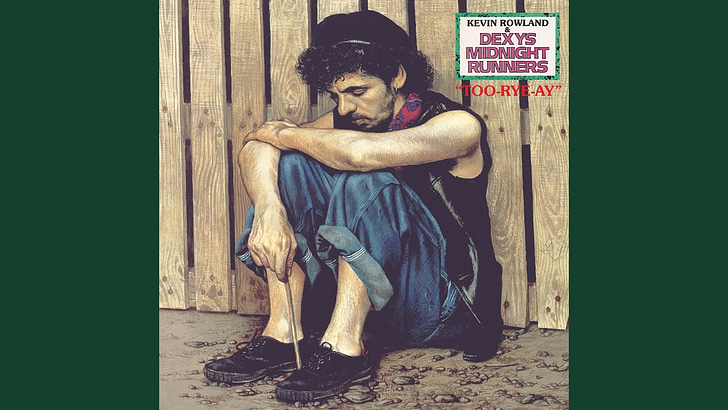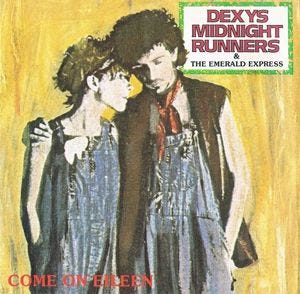“Come On Eileen” by DEXY’S MIDNIGHT RUNNERS
The idiosyncratic Celtic Soul of a contrarian one hit wonder, [Summer of '82 pt. 3]
I'll hum this tune forever
“I hate movements,” Kevin Rowland said as fans started to follow Dexy’s Midnight Runners. Trained as a Vidal Sassoon hairdresser, Rowland had a keen eye for fashion that was matched only by his disdain for everything fashionable. He responded to the notice his first band, The Killjoys, received for their Sex Pistols-y single “Johnny Won’t Get to Heaven” by taking the stage with a blow-dried coif, wearing crisp white shirts, jodhpurs, and boxing boots to sing Bobby Darrin covers. As the post-punk movement embraced dour, black clothes, Rowland took to ruffled shirts and pleated velvet trousers. When Dexy’s scored a plumb slot opening slot for The Specials just as the 2 Tone ska scene was packing clubs with fans wearing skinny ties, trilby hats, and natty tonic suits, Rowland gave the band a look that was straight out of On The Waterfront — knitted watch caps, pea coats, and leather jackets.
Rowland’s scorn for all that was fashionable would also come to include his own band. Dexy’s scored a #1 U.K. hit in 1980 with “Geno.” The song was a tribute to Geno Washington, a U.S. soul singer who had U.K. hit albums in the ‘60s with an English group, The Ram Jam Band. With its subject matter and punchy horns, the track sounded every bit the mission statement for a band that began with a newspaper as soliciting members for a “nine-member new wave-soul group.” They titled their debut Searching for the Young Soul Rebels; they dressed like a gang and carried themselves with the same kind of us-against-the-world attitude; the group was tight but still played soul like a punk band: Dexy’s Midnight Runners had arrived as a fully executed concept. At the height of this success — a top-10 album, appearances on Top Of The Pops, a tour booked across Europe — Rowland declared, “we’ll want the next project to be totally different. Perhaps we’ll do a film.” That 40-date European tour would be the lineup’s last: All but one of the band quit at its end.
“Come On Eileen” was written by Rowland and the remaining Dexy’s member, trombonist “Big” Jim Paterson. Rowland further leaned into his Irish heritage, bonding with the Scot Paterson as the Celtic Soul Brothers. As new members were recruited, Rowland gave them Irish-sounding stage names. Violinist Helen Bevington, who had been weighing a job with the Bilbao Symphony, was hired immediately after her audition for a new string section dubbed The Emerald Express and took on the name Helen O’Hara. That’s her wrist in the opening shot of the “Come On Eileen” video.
This Celtic Soul era is actually Dexy’s 2.1. In between, Rowland had adopted a trim, athletic look (back to boxing boots) with his hair pulled back into a neat ponytail. To add strings to that new lineup, he instructed the horn section to learn cello in two months. After a tour dubbed Projected Passion Revue, which included a well regarded three night run at London’s Old Vic theater, half the band left, again.
That “Come On Eileen” is the best realization of Rowland’s Celtic Soul1 ambitions comes down less to a lineup with violins, accordion, and banjo than Rowland himself. His vocals had always been a stylized yelp, a strident take on the singers on his cherished Soul 45s, like the high, tremulous voice of The Chairmen of the Board’s General Johnson. (Rowland even bites Johnson’s brrrrrrrrrrt! tongue roll on “Geno.”) Here, he is genuinely soulful, reaching deep to use his voice to emphasize the song’s tangle of adolescent emotions.
Come on Eileen, I swear (well he means)
At this moment, you mean everything
You in that dress, my thoughts I confess
Verge on dirty
Ah come on Eileen
These people round here,
wear beaten down eyes
Sunk in smoke dried faces
so resigned to what their fate is
But not us, no not us, we are far too young and clever
(Remember) Toora Loora Toora Loo-Rye-Aye
Eileen I'll hum this tune forever
Anyone who came of age in a small community will recognize the twin emotions driving the song: a mounting carnal desire for someone you grew up with2 and the desire to leave that place where you grew up3. These are certainly not new ideas for pop lyrics. To his credit, Rowland makes the former more boyish than creepy, a fumbling expression of sexual interest still bound up in repressed emotions. Similarly, the song makes loving references to their mothers4 and the songs of their fathers while at the same time expressing that the lives of their elders are hopeless and they are better than that.
That passionate confusion is brought to a boil by the breakdown two-thirds of the way through the song. Chants of “Too-Rye-Ay5” steadily speed up until the song bursts into a squall of sawing violins that slams into the triumphant chorus. It’s glorious, fully embodying the sudden power of feeling, “at this moment, you mean everything.”
The song went #1 in the U.K., with the album Too-Rye-Aye peaking at #2 and sticking on the charts for 46 weeks. “Come On Eileen” was released in the U.S. the following year, and thanks to MTV putting the video into super rotation, went to the top of the pop charts, where it supplanted Michael Jackson’s “Billie Jean.” That video, however, forever fused Dexy’s music with the look Rowland devised for that era of the band – tattered shirts and rolled-up dungarees, falling somewhere between Irish vagabonds and itinerant laborers out of a Steinbeck novel. It wasn’t fashionable, but it was of a fashion, and it made Dexy’s Midnight Runners a novelty in the States, a one hit wonder.6
While the epic amount of airplay “Come On Eileen” received has inured many to its actual quality — familiarity breeding contempt, especially with a song this damnably catchy — it’s a lovely pop song played on traditional instruments in a time that was more about MIDI sequencers. There’s a certain glory in that, no matter the band’s getups. Not that Dexy’s 2.1 was sustainable. By the time the group toured the U.S. behind the album, the vaunted horn section had quit and the band was down to Rowland, O’Hara, and guitarist Kevin “Billy” Adams, who were surrounded by session musicians uninterested in the gang mentality that gave Rowland’s bands their compelling fervor.
Kevin Rowland had worked tirelessly on Dexy’s Midnight Runners, making every plan for success except for what to do with it. “I was fairly comfortable being the outsider knocking on the door,” he later said, “Once the door opened and I stepped inside, I was completely lost."
15 Song Playlist
A survey of Dexy’s Midnight Runners, most of which I feel ages better than you might think. I would 100% go see a band playing like the Young Soul Rebels era. The mix also includes Rowland’s 2020 “As It Should Have Sounded” mix of “Come On Eileen” and a couple of Geno Washington tracks.
Thank You
Hello and welcome to you new subscribers. Thanks so much for singing up. I hope the newsletter meets your expectations.
I’ll be doing (probably) two more Summer of ‘82 songs after this, then it will be back the jumble of eras and genres that TBSE(TW) has always been. Thanks very much for going along this ride. Please do let me know what you think.
Van Morrison at one point had interest in producing the band. After the private show they did for for the Celtic Soul Avatar, he walked out, and that was the last they heard from him.
This is not limited to small towns and such, but I’d argue it’s particularly endemic wherever dating pools are small and is of a piece with wanting to escape into the wider world. Also, this kind of youthfulness in the lyrics makes the idea of getting a girl to go along with his desires is more palatable than the legion of similarly themed songs, from The Raspberries “Go All the Way,” to Rod Stewart’s creepy “Tonight’s The Night” and Gary Puckett & The Union Gap’s beyond-creepy “Lady Willpower.”
Everything from The Animals “We Gotta Get Out of This Place” to any number of songs currently pushing Bruce Springsteen ticket prices into four digits. What’s your favorite?
“Our mothers cried / And sang along who'd blame them?”
This is apparently more akin to “Gabba Gabba Hey” than any actual Gaelic
If you’re asking, I don’t like the term One Hit Wonder, because it lumps together artists whose long careers but with only a brief burst of pop radio airplay with pop confections that were ephemeral by design. It is also a little too jeering, especially considering all that is out of an artist’s control and wholly irrespective of a song’s quality, like how much money a label pays to get a song in rotation.





“Come On Eileen” has been on every mix tape I ever made. And I don’t think I’ve ever met anybody who loves the song with the kind of passion that I do.